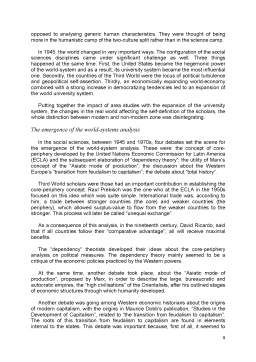Extras din referat
Immanuel Maurice Wallerstein is an American sociologist, historical social scientist, and the founder of the intellectual school of world-systems theory.
His reputation as an international theorist is based on his radical attempts to reconceptualise international relations in the context of his arguments concerning the nature and history of the modern capitalist “world-system”. Wallerstein is the pioneer of world-systems theory, which is based in part on radical dependency theories of underdevelopment in the 1950s, as well as the French Annales School of historiography.
What is the world-systems analysis?
The World-systems approach is a view of the recent five centuries of world history and Wallerstein placing the origin of the actual world-system to the "long 16th century", and defines it as:
"…a social system, one that has boundaries, structures, member groups, rules of legitimation, and coherence. Its life is made up of the conflicting forces which hold it together by tension and tear it apart as each group seeks eternally to remold it to its advantage. It has the characteristics of an organism, in that it has a life-span over which its characteristics change in some respects and remain stable in others. One can define its structures as being at different times strong or weak in terms of the internal logic of its functioning."
World-systems analysis is not a theory, but an approach to social analysis and social change.
Historical origins of world-systems analysis
World-systems analysis developed in the early 1970s as a new perspective on social reality, but like any other perspective it has built on earlier arguments and critiques, meaning that something similar must have been said some decades or centuries earlier.
The story about the appearance of the world-systems analysis is fixed in the history of the modern world-system and the structures of knowledge that grew up as part of that system. The beginning of this story can be found back in the mid-eighteenth century, when the capitalist world-economy existed already for some two centuries, which was generating a need for constant technological change and a constant expansion of the geographical, psychological, intellectual and scientific frontiers.
Philosophers were challenging the dictates of the theologians (that they alone had a sure way to know truth), saying that human beings could discern truth directly by using their rational faculties, whereas a group of scholars agreed about the role of theologians, but argued that the so-called philosophical insight and the divine revelation were on the same level as a source of truth. The latter insisted on giving priority to empirical analyses of reality, a moment when they would start to be called scientists.
This was the time, in the late eighteenth century, when what some now call the “divorce” between philosophy and science occurred. This divorce was imposed by those defending the empirical “science”, saying that the only way to “truth” was by theorizing based on induction from empirical observations and that metaphysical deduction was speculation and had no “truth”-value, refusing to think of themselves as “philosophers”.
In the background of this so-called divorce, the modern university was born, being built on the framework of the medieval university and having a structure different from the medieval one, which had four faculties: theology, medicine, law and philosophy.
In the nineteenth century, the faculty of philosophy was divided into two: a faculty covering the “sciences” and one called the “humanities” or at times “arts” or “letters”, covering other subjects.
These two faculties were at war with each other, each insisting that it is the best way to obtain knowledge. The sciences were based on empirical research and hypothesis testing, whereas the humanities were based on empathetic insight (or later called hermeneutic understanding).
The sciences did not agree with the humanities’ ability to discern truth. Before the separation of the faculties, the search for true, the good and the beautiful were closely related. After the separation, the scientists denied their work being related with a search for the good or the beautiful, merely the true.
All this division of knowledge lead to creating a high barrier between the search for the true and the search for the good and beautiful.
Preview document
Conținut arhivă zip
- World Systems Analysis.doc

























